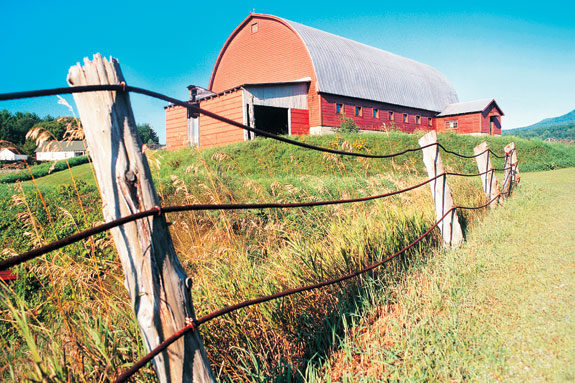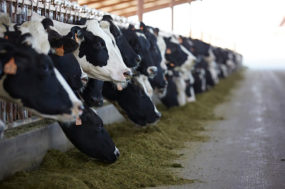“We teach what we need to learn” is my mantra, and I guess since I am still sharing my life issues, I am still learning. In fact, one of my strengths is that I am a life-long learner.
Dr. Henry Cloud is my favourite mentor about boundaries, and his “One Life Solution Workbook” engages us to seek out an audit of our time, our weak spots – which he calls holes in the fences of our boundaries. I have summarized his 10 laws of boundaries with my spin for farms.
1. Sowing and reaping. We reap what we sow. This should be fairly obvious to all farmers and gardeners, but how do we put this into practice?If we make certain choices or have good behaviours, we should like the outcomes or the natural consequences of our actions. My mom’s fridge magnet said, “You can’t soar with the eagles in the morning if you hoot with the owls all night.” Are you happy with the things you are sowing and reaping in your farm team relationships? Without the gardener, there is no garden.
2. Responsible to and for. Sometimes as type A parents we do too much for our adult children, whose life task is to become independent and responsible members of society.
Are you guilty of doing too much to rescue a child, causing a hole in your boundary fence? Ask yourself this question: “What do others on this farm need to learn to do for themselves?” For some reason, laundry springs to mind.
3. Power to choose. My essential message as a farm coach is that it is “your farm, your family, your choice.” Some farmers in transition are blown away by the thought that they actually have choices in the way they live their lives.
They can choose to say “no, not at this time.” They can ask for what they need, and they can ask others, “What would you like me to do differently?” You could sell the cows.
4. Respect. When you respect yourself, you do not allow bad behaviours or things that suck the emotional energy out of you. Cloud calls these actions “power drains.” Why have you let go of your self-control and self-respect and given power to someone else to control your decisions?
I have very little patience for families who are into the “blame game” or “poor-me victim roles.” Are you giving others on your farm the respect that you crave? Whom have you let take away your personal power?
5. Motivation. When I felt too fat to get a decent dress for our son’s wedding (which is this month), I hit the good nutrition and exercise path once again. I got results instead of tears and was highly motivated to stay on track. If you are only motivated by the size of your farm and the number of zeros on your balance sheet,
I think you might lose your motivation when weather issues hit, and your family doesn’t recognize you at the family gatherings. What is it that you cheerfully are driven to do on your farm?
What is it that you are doing when you lose all track of time? Know what your good drivers of success are, and accept the fact that your sons and daughters may have different motivation than you do. “Different is not wrong; it is just different.”
6. Evaluation of pain. Dairy cow handlers need to have that sixth sense to figure out what is bothering an animal in pain. Do we take the same sensitivity with people to figure out whether our directness of communication with them has caused a justified offense or something else?
We do not intend to cause harm to others on our team, but everyone has a different perspective on conflict issues. We need to be emotionally strong enough to check out what the effect of our words and actions has been.
Make quick repair of true hurt that you cause. Some folks are gifted “at huge drama,” and the pain caused may be out of proportion to what is the current reality.
7. Proactivity. There is a popular acne medication called Proactiv for zits. Think about the things you do to prevent bad stuff from happening on your farm, like shoveling the excess snow this past winter off your outbuildings to prevent collapse.
Be able to anticipate the things you need to do for farm safety on the physical side, and be a good listener to anticipate how your farm team needs encouragement for the busy season ahead. Put some deposits in the emotional bank account before the withdrawal times of machinery breakdowns and getting the next cut of hay.
8. Envy. When we desire what someone else has, it becomes envy. Don’t worry about what the neighbours appear to have; get rid of your root of bitterness.
Good desire stems from ownership and responsibility to create the outcomes you earn. I pray for all farm families that God would give them the desires of their heart. I also pray that they would understand that “the sluggard craves and gets nothing; the desires of the diligent are fully satisfied”(Proverbs 13:4). Have a family business meeting this week.
9. Activity. My husband is highly task-oriented, which is a great blessing to our marriage because things get done in a timely fashion with family affairs and the farm business. I am a doer also.
The law of physics states that action begets action. Stop whining about what is not done, and start moving toward completing the tasks that you need to do. If the priorities are aligned with your values, you likely will be much happier than if you are being “forced” to work out someone else’s agenda.
10. Exposure is about having others know where you stand. Your boundaries, wishes and values are very clear because no one needs to read your mind to find out what you stand for.
The highest compliment for me is to be affirmed for congruent behaviour and integrity. In our family and businesses we have zero tolerance for dishonesty.
Practice the above principles on your farm. Good neighbours keep good fences. Don’t let the holes in your fences go without repair.
Live with great boundaries. Enjoy a happier family. PD
Elaine Froese is a certified coach and farmer. Seek out her encouragement by signing up for her monthly e-newsletters at. “Like” her on Facebook and share your “intentional life” success with her.









